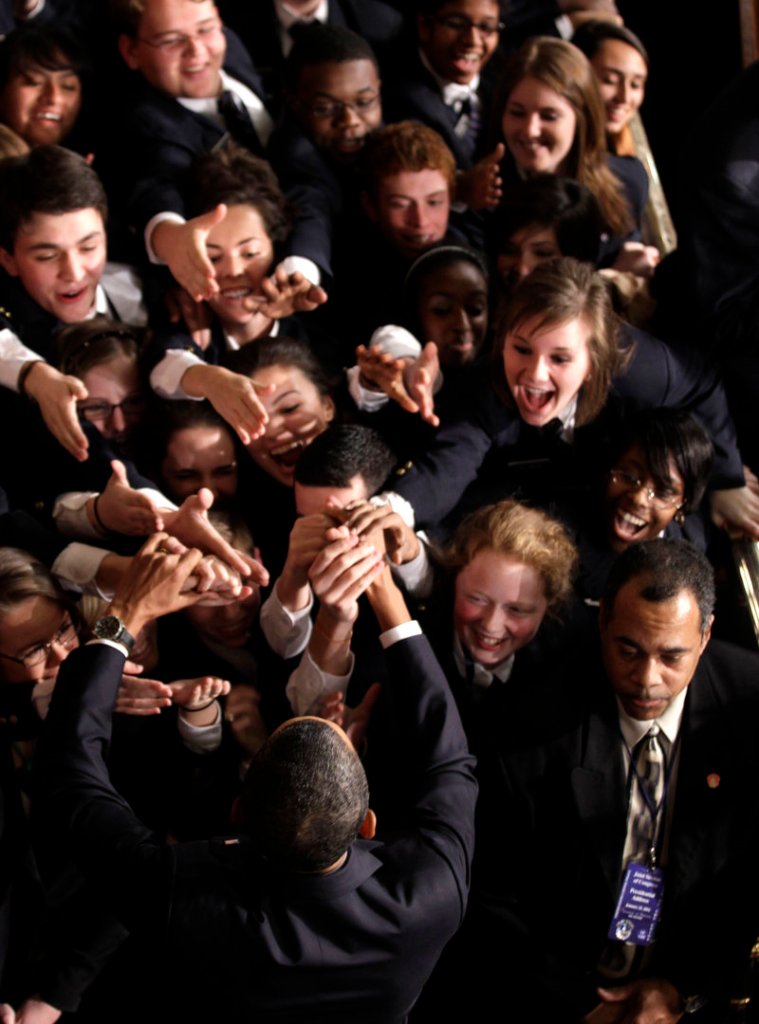WASHINGTON – President Obama and his party may have suffered a historic defeat in November’s midterm elections, but in his State of the Union address on Tuesday night, Obama was anything but on the defensive.
His speech was most notable not for the nods he made to the changed political balance or the issues that cost the Democrats their majority in the House and that shaved their majority in the Senate – although he did do that. More striking was his effort to frame the coming debates over spending and the role of government in ways that are designed to put Republicans on the defense as the fights begin.
Although this was a speech long on policy and big ideas, it was a political argument as well. Obama’s address, a call for the nation to win the future, was an effort to move the debates that framed the election to a different place.
It was a defense of the active use of government to prepare the country for the long-term challenge of global competitiveness, but without calls for a national health-care plan or an enormous economic stimulus package that so inflamed the political environment over the past two years.
Obama said that dealing with the deficit is crucial to ensuring the country’s competitive might. But he warned, in essence, that the goal of cutting spending alone should not eclipse the assurance that the U.S. economy remains the world’s strongest.
Much has changed since the November elections, and the president took advantage of those changes. His success in the lame-duck session of Congress helped restore some of his political balance and boost his standing. His well-received speech at a memorial service in Tucson after the shootings there put him in an even stronger position.
The shootings that left six dead and 13 wounded, including Rep. Gabrielle Giffords, D-Ariz., also changed the overheated partisan environment.
On Tuesday night, Obama sought to capitalize on the post-Tucson atmosphere of lowered voices and greater political civility to again reprise the themes of unity and common purpose that helped him win the White House in 2008.
After two years of hard partisan debate, Obama argued that the voters’ decision to produce divided government means there can be progress only through cooperation and compromise between the parties.
“We will move forward together, or not at all,” he said.
The president’s words will not head off difficult discussions, particularly about government spending and health care.
Republicans are not buying his calls for new investment, which they consider government spending by another name. But it was clearly his goal Tuesday to try to put the onus on Republicans to defend the spending cuts they are pledging to pursue, rather than allowing them to seize the initiative first.
On health care, the most contentious issue of the past two years, Obama devoted only two paragraphs. He said he is open to improvements but vowed to resist any GOP efforts to undo the benefits in the new law.
In another challenge for the parties to work together, he said, “So instead of re-fighting the battles of the last two years, let’s fix what needs fixing and move forward.”
There was much Obama did not say, or at least said in only the most general terms, leaving open whether he is truly serious about cutting spending – or whether his new strategy will convince independent voters and others that he really has gotten the message from the midterms.
Although the nation’s unemployment rate still stands at 9.4 percent, the president hardly dealt with short-term efforts to produce jobs – even though that may be the most important factor in determining whether he is reelected in 2012.
Instead, he praised the work done in the lame-duck session to inject more money into the economy and sounded a cheerleader’s tone to say that the worst is over. Whether the public agrees is another question. There are some signs of optimism, but there is much room for improvement.
On spending, which Republicans consider the main reason for their midterm success, Obama acknowledged the problem. But his call for a five-year freeze in discretionary domestic spending was a longer version of his approach a year ago and left open the question of just where he plans to cut to offset the new spending he seemed to be calling for.
On that front, however, Republicans are not doing much better. They passed a resolution Tuesday pledging to return to 2008 levels of spending, but have not put specifics behind the goal.
The president did not tackle the biggest causes of the country’s long-term fiscal imbalance. Although he created a deficit commission, the best he could do was to say it has done a credible job and that the conversation it started should continue.
Republicans said Tuesday that they expected the president to deliver an impressive speech, but doubted whether he could match his words with actions in the coming months.
Send questions/comments to the editors.



Comments are no longer available on this story